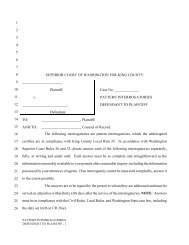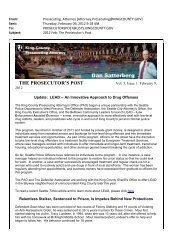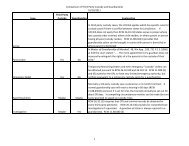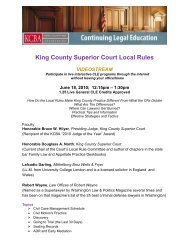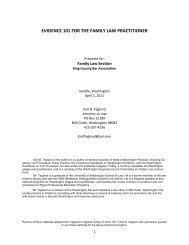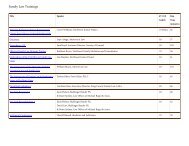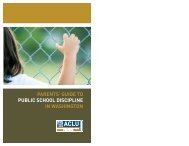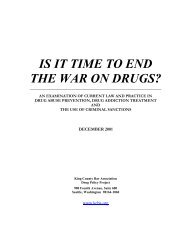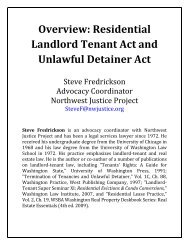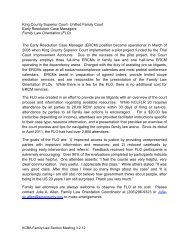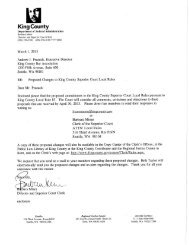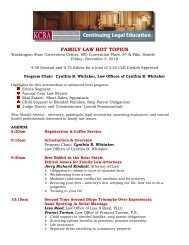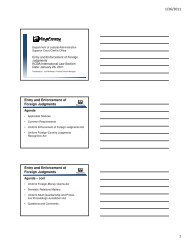Effective Drug Control: Toward A New Legal Framework
Effective Drug Control: Toward A New Legal Framework
Effective Drug Control: Toward A New Legal Framework
Create successful ePaper yourself
Turn your PDF publications into a flip-book with our unique Google optimized e-Paper software.
Assuming that the U.S. Supreme Court would not second-guess a legislative<br />
policy decision made in Washington, or in any other state, pursuant to its police powers<br />
to protect health, welfare and safety, Washington could confidently establish its own<br />
state-level regulatory system to control those psychoactive substances currently produced<br />
and distributed exclusively in illegal markets. Whether or not the state were to create its<br />
own regulatory system, Washington may still decline to enforce or provide appropriations<br />
for its share of the enforcement of federal drug laws, which many states did during<br />
national prohibition of alcohol in the 1920s. 566 A long line of cases supports the principle<br />
that the federal government may not “commandeer” states, 567 nor may it compel state and<br />
local law enforcement officers to enforce federal laws. 568 The state legislature may even<br />
prohibit state law enforcement officers from cooperating with federal agents, which has<br />
already happened in California localities in connection with its medical marijuana laws.<br />
Exclusive Regulation of Medical Practice<br />
Recent case law has limited federal authority to meddle in the states’ regulation of<br />
medical practice, particularly limiting the use of the federal <strong>Control</strong>led Substances Act to<br />
override a state's decisions concerning what constitutes “legitimate” medical practice. 569<br />
Drafters of the Uniform <strong>Control</strong>led Substances Act acknowledged that the federal focus<br />
on controlling drug use might chill the legitimate practice of medicine, especially<br />
regarding the prescription of narcotics. 570 However, Congress never intended, through the<br />
<strong>Control</strong>led Substances Act or other federal laws, to grant blanket authority to the U.S.<br />
Attorney General or to the federal <strong>Drug</strong> Enforcement Agency to define, as a matter of<br />
federal policy, what constitutes the legitimate practice of medicine.<br />
Despite questioning by the courts, federal authorities are pressing ahead to<br />
regulate doctors’ use of drugs, particularly for the purpose of treating chronic pain. As a<br />
result, the antipathy of medical practitioners toward the federal bureaucracy is reaching<br />
the boiling point. 571<br />
States’ broad police powers are supposed to preclude the federal exercise of<br />
authority in matters of medical practice. 572 The regulation of the medical field has<br />
historically come under the primary control of the individual states, including the power<br />
to regulate the administration of drugs by health professionals. 573 Accordingly, to the<br />
extent that the regulation of drugs is a medical issue, a state could authorize the creation<br />
of medical prescription programs as a new addiction treatment modality, along the model<br />
of the successful prescription programs now operating in Europe and Canada. 574<br />
State as “Market Participant”<br />
When a state functions like a commercial enterprise it may “discriminate” in favor<br />
of its own residents and, as a business proprietor (or “market participant”), it is free of<br />
Commerce Clause limitations and the reach of federal commerce power. 575 Accordingly,<br />
if the state of Washington or any other state sought to undercut the illicit market in<br />
psychoactive substances by becoming the exclusive purveyor of such substances to<br />
qualified state residents, it might be allowed to set restrictive rules that “discriminate”<br />
against out-of-state residents and that impose burdens on interstate commerce that would<br />
otherwise not be permitted. 576



